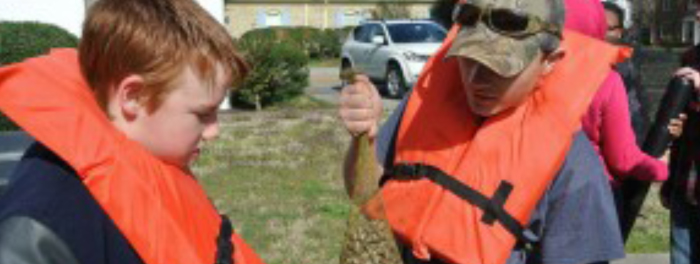The Virginian-Pilot
©
PORTSMOUTH
With two grown sons, a waterfront home and more free time, Ray and Ellen Comstock are enjoying life in their empty nest.
So one may wonder why the Sterling Point couple chose to become foster parents last weekend.
That’s when 16 students from Waters Middle School stopped by to drop off 1,000 baby oysters, called “spats,” that the Comstocks will nurture through August.
Ellen Comstock said she was talking to her newspaper carrier, Waters science teacher Sherrye Pollard, one morning when she learned the teacher was heading an oyster project to help repopulate the Elizabeth River.
“Oh, I’d love to raise oysters!” Comstock told her.
Pollard thought, “Why not?” and told Comstock she would arrange to have students bring some oysters for her to float from her dock on Sterns Creek, which feeds into the Western Branch of the Elizabeth River.
Comstock talked to several of her neighbors, and two other families also are taking on some baby oysters.
Pollard said the project is part of the Wheelabrator Symposium for Environment and Education, a program celebrating its 20th anniversary of inspiring middle school students to become environmental community leaders.
Wheelabrator Technologies, which has a waste-to-energy plant in Portsmouth, started hosting the annual symposium at Waters Middle School four years ago. Students apply for 20 slots to participate in the after-school “Wheelabrator Team” that examines local environmental issues and conducts a community service project.
This year’s project theme is “Connecting to the Oceans,” linking the quality of the local environment to the health of the surrounding seas. Past symposium themes have including air quality, the impact of climate change and wildlife habitat preservation.
Pollard’s students explored the health of the Elizabeth River as it affects the quality of the Chesapeake Bay.
“I learned that oysters are one of the most important parts of the Chesapeake Bay, along with menhaden, for clarifying the water,” said Elvis Buckman, 14.
Oysters feed on algae and filter it out of the water, he said. One oyster can filter 50 gallons of water a day.
Elvis and nine other Waters students will join about 140 from schools along the East Coast who will travel to Broward County, Fla., in May. They’ll present their projects to a panel of Wheelabrator employees, educators and environmental experts – including ocean explorer Fabien Cousteau – at Wheelabrator’s annual four-day symposium.
Cousteau, the grandson of Jacques Cousteau, will be guest speaker at the event.
The Waters eighth-graders have created a skit as their presentation with characters like Omega Protein, the Chesapeake Bay, Mother Nature, a softball player and a game warden. The dramatic presentation will highlight the challenges and solutions to improving the health of local waterways.
“Our kids will get to interact with students from so many environments,” said Maureen Mizelle, who retired from Portsmouth Schools Foundation last year and helps with the Wheelabrator project. “For middle school students to stand in front of 200 people in a ballroom and make a presentation of their scientific research is a very unique opportunity.”
Caleigh Balestra, 14, said the group has been raising 6,000 oysters that were provided to them by The College of William and Mary’s Virginia Institute of Marine Science.
The project, Caleigh said, grabbed her attention “because we get to make a difference and help our environment because it’s the only one we have.”
Oysters provide a healthy marine environment and food, but they also provide a habitat for other water animals, said William Harris, 15.
On a recent Saturday morning, students wearing life vests trekked down the Comstock’s pier with a bag of oysters, a float that will house them, and notebooks where they recorded the sizes of a random sampling of 50 of the 1,000 mollusks.
“It’s a way to help determine how much they’re growing over the next few months,” Pollard said. “They grow slower in colder water and faster in warmer water. They’ve been growing slowly over the past few months because of the cold temperatures.”
Students will visit the floats monthly and take new measurements to compare. In August, they will transfer the oysters to a reef in the Elizabeth River and the “foster parents” will be invited to go along.
“I’m happy the students will be able to come out and monitor the oysters,” Ellen Comstock said. “I’m excited to be a part of it.”
Lia Russell, 222-5562, lia.russell@pilotonline.com

